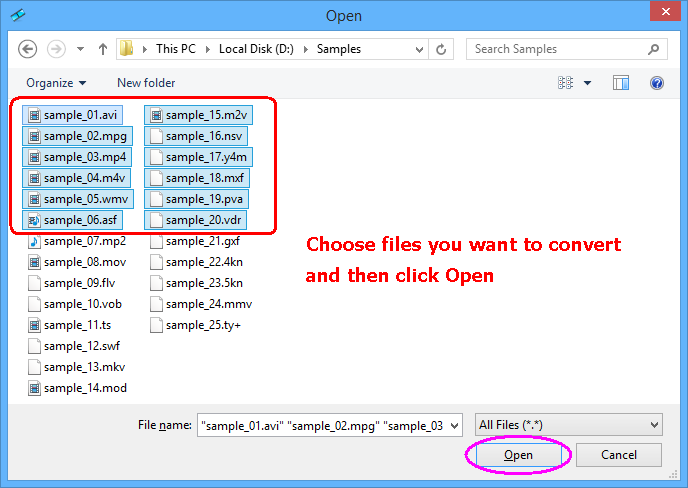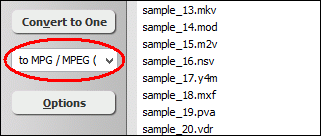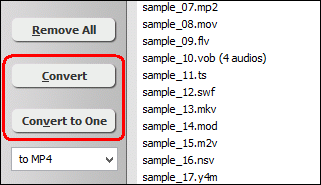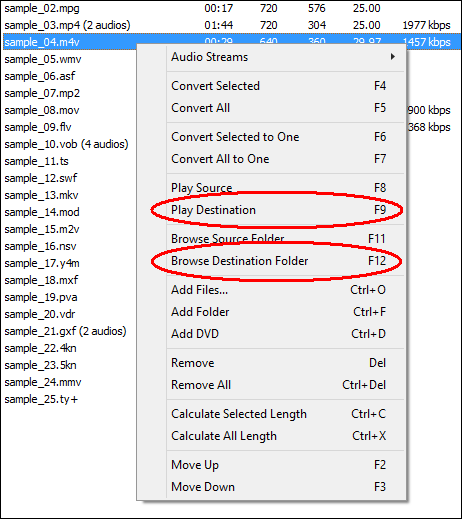 |
Convert 3GPP to MPEG
|
3GPP to MPEG Converter converts 3GPP files to
MPEG. It's an easy-to-use and ALL-IN-ONE video and audio converter software.
The converter also converts media file to the major formats such as AVI, MPG / MPEG, M4V, OGV, H.264, MP4, 3G2, iPhone,
etc. It could convert Y4M to AVI, AVI to FLV, M2TS to H.264, VCD to 3GP, DXA to DivX, RMVB to DivX, and so on.
3GPP to MPEG Converter supports batch conversion
that enables you convert bulk 3GPP files to MPEG at a time. The software is
full compatible with 32-bit and 64-bit editions Windows 10/8/7/Vista/XP/2000.

What is 3GPP?
3GP (3GPP file format) is a multimedia container format defined by the Third Generation
Partnership Project (3GPP) for 3G UMTS multimedia services. It is used on 3G mobile
phones but can also be played on some 2G and 4G phones.
3GP is defined in ETSI 3GPP technical specification. 3GP is required file format
for video and associated speech/audio media types and timed text in ETSI 3GPP
technical specifications for IP Multimedia Subsystem (IMS), Multimedia Messaging
Service (MMS) and Transparent end-to-end Packet-switched Streaming Service (PSS).
The 3GP file format stores video streams as MPEG-4 Part 2 or H.263 or MPEG-4
Part 10 (AVC/H.264), and audio streams as AMR-NB, AMR-WB, AMR-WB+, AAC-LC, HE-AAC
v1 or Enhanced aacPlus (HE-AAC v2). 3GPP allowed use of AMR and H.263 codecs in
the ISO base media file format (MPEG-4 Part 12), because 3GPP specified the usage
of the Sample Entry and template fields in the ISO base media file format as well
as defining new boxes to which codecs refer. These extensions was registered by
the registration authority for code-points in ISO base media file format ("MP4
Family" files). For the storage of MPEG-4 media specific information in 3GP
files, the 3GP specification refers to MP4 and the AVC file format, which are
also based on the ISO base media file format. The MP4 and the AVC file format
specifications described usage of MPEG-4 content in the ISO base media file format.
What is MPEG?
The Moving Picture Experts Group (MPEG) was formed by the ISO to set standards
for audio and video compression and transmission. Its first meeting was in May
1988 in Ottawa, Canada. As of late 2005, MPEG has grown to include approximately
350 members per meeting from various industries, universities, and research institutions.
MPEG's official designation is ISO/IEC JTC1/SC29 WG11.
The MPEG standards consist of different Parts. Each part covers a certain aspect
of the whole specification. The standards also specify Profiles and Levels. Profiles
are intended to define a set of tools that are available, and Levels define the
range of appropriate values for the properties associated with them. MPEG has
standardized the following compression formats and ancillary standards:
- MPEG-1: The first compression standard for audio and video. It was
basically designed to allow moving pictures and sound to be encoded into the bitrate
of a Compact Disc. To meet the low bit requirement, MPEG-1 downsamples the images,
as well as uses picture rates of only 24-30 Hz, resulting in a moderate quality.
It includes the popular Layer 3 (MP3) audio compression format.
- MPEG-2: Transport, video and audio standards for broadcast-quality
television. MPEG-2 standard was considerably broader in scope and of wider appeal
- supporting interlacing and high definition. MPEG-2 is considered important because
it has been chosen as the compression scheme for over-the-air digital television
ATSC, DVB and ISDB, digital satellite TV services like Dish Network, digital cable
television signals, SVCD, and DVD.
- MPEG-3: Developments in standardizing scalable and multi-resolution
compression which would have become MPEG-3 were ready by the time MPEG-2 was to
be standardized; hence, these were incorporated into MPEG-2 and as a result there
is no MPEG-3 standard. MPEG-3 is not to be confused with MP3, which is MPEG-1
Audio Layer 3.
- MPEG-4: MPEG-4 uses further coding tools with additional complexity
to achieve higher compression factors than MPEG-2. In addition to more efficient
coding of video, MPEG-4 moves closer to computer graphics applications. In more
complex profiles, the MPEG-4 decoder effectively becomes a rendering processor
and the compressed bitstream describes three-dimensional shapes and surface texture.
MPEG-4 also provides Intellectual Property Management and Protection (IPMP) which
provides the facility to use proprietary technologies to manage and protect content
like digital rights management. Several new higher-efficiency video standards
(newer than MPEG-2 Video) are included (an alternative to MPEG-2 Video), notably:
- MPEG-4 Part 2 (or Simple and Advanced Simple Profile) and
- MPEG-4 AVC (or MPEG-4 Part 10 or H.264). MPEG-4 AVC may be used on
HD DVD and Blu-ray discs, along with VC-1 and MPEG-2.
In addition, the following standards, while not sequential advances to the
video encoding standard as with MPEG-1 through MPEG-4, are referred to by similar
notation:
- MPEG-7: A multimedia content description standard.
- MPEG-21: MPEG describes this standard as a multimedia framework.
Moreover, relatively more recently than other standards above, MPEG has started
following international standards; each of the standards holds multiple MPEG technologies
for a way of application. For example, MPEG-A includes a number of technologies
on multimedia application format.
- MPEG-A: Multimedia application format.
- MPEG-B: MPEG systems technologies.
- MPEG-C: MPEG video technologies.
- MPEG-D: MPEG audio technologies.
- MPEG-E: Multimedia Middleware.
How to Convert 3GPP to MPEG?
- Free Download
3GPP to MPEG Converter
- Install the software by instructions
- Launch 3GPP to MPEG Converter
- Choose 3GPP Files

Click "Add Files" to choose 3GPP files and then add them
to conversion list.

Choose one or more 3GPP files you want to convert and then click Open.
- Choose "to MPG/MPEG"

You can also convert file to MP4 or MP2 with the program.
- Convert 3GPP to MPEG

Click on "Convert" to convert 3GPP files to MPEG format; alternatively,
click on "Convert to One" to convert all files in list and
combine to a single one MPEG file.

The software is converting 3GPP files to MPEG format.
- Play and Browse MPEG File

When conversion completes, you could right-click on converted file and choose
"Play Destination" to play the outputted MPEG file; or choose "Browse
Destination Folder" to open Windows Explorer to browse the MPEG file.
Top
3GPP to MPEG Converter is 100% clean and safe to install.
It's certified by major download sites.

3GPP to MPEG Related Topics:
|

